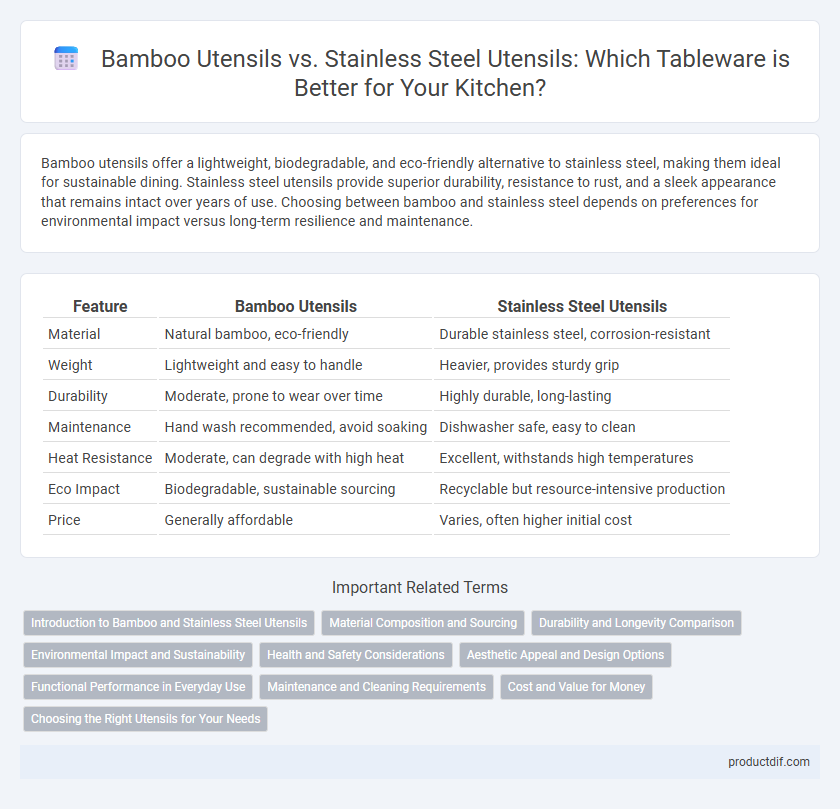Bamboo utensils offer a lightweight, biodegradable, and eco-friendly alternative to stainless steel, making them ideal for sustainable dining. Stainless steel utensils provide superior durability, resistance to rust, and a sleek appearance that remains intact over years of use. Choosing between bamboo and stainless steel depends on preferences for environmental impact versus long-term resilience and maintenance.
Table of Comparison
| Feature | Bamboo Utensils | Stainless Steel Utensils |
|---|---|---|
| Material | Natural bamboo, eco-friendly | Durable stainless steel, corrosion-resistant |
| Weight | Lightweight and easy to handle | Heavier, provides sturdy grip |
| Durability | Moderate, prone to wear over time | Highly durable, long-lasting |
| Maintenance | Hand wash recommended, avoid soaking | Dishwasher safe, easy to clean |
| Heat Resistance | Moderate, can degrade with high heat | Excellent, withstands high temperatures |
| Eco Impact | Biodegradable, sustainable sourcing | Recyclable but resource-intensive production |
| Price | Generally affordable | Varies, often higher initial cost |
Introduction to Bamboo and Stainless Steel Utensils
Bamboo utensils offer a sustainable, biodegradable option made from fast-growing bamboo, known for its natural antimicrobial properties and lightweight design. Stainless steel utensils provide durability, resistance to rust and corrosion, and a sleek, modern aesthetic suited for long-term use. Both materials cater to different needs, with bamboo emphasizing eco-friendliness and stainless steel prioritizing strength and longevity.
Material Composition and Sourcing
Bamboo utensils are crafted from fast-growing, renewable bamboo plants, making them an eco-friendly option with biodegradable properties. Stainless steel utensils are composed primarily of iron, chromium, and nickel alloys, providing durability and resistance to corrosion, sourced mainly from mined metals with significant energy consumption during production. The natural origin and minimal processing of bamboo contrast with the intensive refining and alloying processes involved in stainless steel utensil manufacturing.
Durability and Longevity Comparison
Bamboo utensils offer lightweight, eco-friendly durability but tend to wear down faster with frequent use compared to stainless steel utensils. Stainless steel utensils boast superior longevity due to their resistance to rust, corrosion, and physical damage, making them ideal for heavy daily use. The inherent strength of stainless steel ensures consistent performance and minimal maintenance over years, whereas bamboo requires careful handling to maximize lifespan.
Environmental Impact and Sustainability
Bamboo utensils offer a renewable, biodegradable alternative to stainless steel, significantly reducing landfill waste and carbon emissions associated with metal production. Stainless steel utensils, while durable and recyclable, require extensive mining and energy consumption, contributing to environmental degradation. Choosing bamboo supports sustainable forestry practices, whereas stainless steel's longevity can reduce resource use over time but often at a higher initial environmental cost.
Health and Safety Considerations
Bamboo utensils are naturally antimicrobial, hypoallergenic, and free from harmful chemicals, making them a safer choice for health-conscious users compared to stainless steel utensils, which may leach nickel or chromium in rare cases. Bamboo is biodegradable and less likely to harbor bacteria when properly maintained, whereas stainless steel requires thorough cleaning to prevent rust or bacterial buildup in scratches. Both materials are durable, but bamboo's eco-friendly and non-toxic properties offer significant health and safety advantages over metal counterparts.
Aesthetic Appeal and Design Options
Bamboo utensils offer a natural, warm aesthetic with unique grain patterns that complement eco-friendly and rustic table settings, making them ideal for sustainable design choices. Stainless steel utensils provide a sleek, modern look with polished finishes and contemporary shapes, suiting minimalist and luxurious dining experiences. The design versatility of stainless steel allows intricate detailing and a wide range of styles, while bamboo utensils highlight organic textures and handcrafted appeal.
Functional Performance in Everyday Use
Bamboo utensils offer lightweight, natural antimicrobial properties, making them ideal for gentle food handling and minimal heat conduction during everyday use. Stainless steel utensils provide superior durability, resistance to corrosion, and high heat tolerance, ensuring long-lasting performance in various cooking environments. Functional performance depends on preferences for eco-friendliness and warmth retention with bamboo, versus strength and versatility with stainless steel.
Maintenance and Cleaning Requirements
Bamboo utensils require gentle hand washing with mild soap and should be air-dried to prevent cracking or warping, avoiding prolonged soaking or dishwasher use. Stainless steel utensils offer superior durability with easy maintenance, as they are dishwasher-safe and resistant to rust and stains. Regular cleaning of both types ensures hygiene, but stainless steel demands less careful handling for long-term preservation.
Cost and Value for Money
Bamboo utensils typically offer a lower upfront cost and are biodegradable, making them an eco-friendly choice for budget-conscious consumers. Stainless steel utensils, while more expensive initially, provide greater durability, resistance to rust, and long-term value through years of use. Investing in stainless steel ensures cost efficiency over time due to their longevity and minimal replacement needs.
Choosing the Right Utensils for Your Needs
Bamboo utensils offer lightweight, biodegradable, and eco-friendly advantages, making them ideal for sustainable lifestyles and outdoor use. Stainless steel utensils provide durability, resistance to rust, and ease of cleaning, suited for daily heavy-duty cooking and longevity. Selecting the right utensils depends on factors such as environmental impact, usage frequency, maintenance preferences, and budget considerations.
Bamboo Utensils vs Stainless Steel Utensils Infographic

 productdif.com
productdif.com